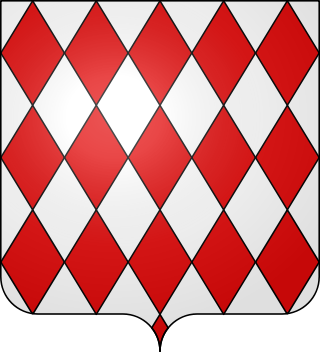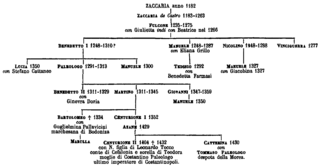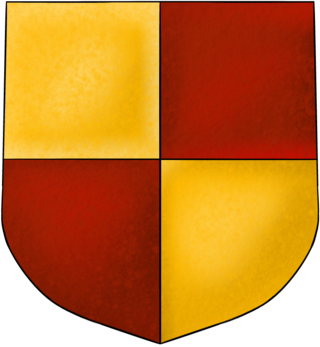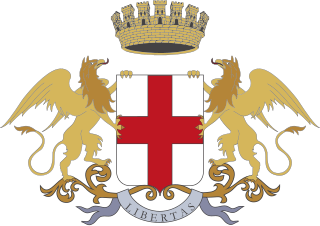
The Republic of Genoa was a medieval and early modern maritime republic from the years 1099 to 1797 in Liguria on the northwestern Italian coast. During the Late Middle Ages,it was a major commercial power in both the Mediterranean and Black Sea. Between the 16th and 17th centuries,it was one of the major financial centres in Europe.

The House of Doria originally de Auria,meaning "the sons of Auria",and then de Oria or d'Oria,is an old and extremely wealthy Genoese family who played a major role in the history of the Republic of Genoa and in Italy,from the 12th century to the 16th century. Numerous members of the dynasty ruled the republic first as Capitano del popolo and later as Doge.

Grimaldo Canella was the youngest son of Otto Canella and Consul of Genoa in 1162,1170,and 1184. Grimaldo is considered the progenitor and eponym of the House of Grimaldi.

The Battle of Meloria was fought near the islet of Meloria in the Ligurian Sea on 5 and 6 August 1284 between the fleets of the Republics of Genoa and Pisa as part of the Genoese-Pisan War. The victory of Genoa and the destruction of the Pisan fleet marked the decline of the Republic of Pisa.

Genoa,Italy,has historically been one of the most important ports on the Mediterranean.

Benedetto I Zaccaria was an Italian admiral of the Republic of Genoa. He was the Lord of Phocaea and first Lord of Chios,and the founder of Zaccaria fortunes in Byzantine and Latin Greece. He was,at different stages in his life,a diplomat,adventurer,mercenary,and statesman.

The Venetian–Genoese Wars were four conflicts between the Republic of Venice and the Republic of Genoa which took place between 1256 and 1381. Each was resolved almost entirely through naval clashes,and they were connected to each other by interludes during which episodes of piracy and violence between the two Italian trading communities in the Mediterranean Sea and the Black Sea were commonplace,in a "cold war" climate.

The Zaccaria family is an ancient and noble Genoese House that had great importance in the development and consolidation of the Republic of Genoa in the thirteenth and fourteenth centuries,and whose only surviving branch produced the last ruling dynasty of the Principality of Achaea.

The Doge's Palace is a historical building in Genoa,northern Italy.

The House of Spinola,or Spinola family,was a leading Italian political family centered in the Republic of Genoa. Their influence was at its greatest extent in the thirteenth and fourteenth centuries.

Oberto Spinola was an Italian politician,a leader of the Republic of Genoa in the 13th century.
Lamba D'Oria (1245–1323) was an Italian admiral of the Republic of Genoa.

The Battle of Settepozzi was fought in the first half of 1263 off the Greek island of Settepozzi between a Genoese–Byzantine fleet and a smaller Venetian fleet.

Giovanni II Valente (1280–1360) was the third Doge of Genoa from 1350 to 1353. His time in office was marked by the crushing defeat of the city against the Venetians at the naval Battle of Alghero. Giovanni had already asked to succeed the first doge of the Republic in December 1345 but had turn down the responsibility.
Curlo is the name of one of the oldest Italian noble families with the titles of Marquess,and patricians of Ventimiglia,Taggia and Genoa.

The Palazzo Spinola di Pellicceria,also known as Palazzo Francesco Grimaldi,is a palace located in piazza di Pellicceria in the historical center of Genoa,Northwestern Italy. The palace was one of the 163 Palazzi dei Rolli of Genoa,the selected private residences where the notable guests of the Republic of Genoa were hosted during State visits. On 13 luglio del 2006 it was added to the list of 42 palaces which now form the UNESCO World Heritage Site Genoa:Le Strade Nuove and the system of the Palazzi dei Rolli. It is currently owned by the Ministry of Cultural Heritage and Activities and Tourism and houses the National Gallery of Art in Palazzo Spinola.

The Battle of Trapani took place on 23 June 1266 off Trapani,Sicily,between the fleets of the Republic of Genoa and the Republic of Venice,as part of the War of Saint Sabas (1256–1270). During the war,the Venetians held the upper hand in naval confrontations,forcing the Genoese to resort to commerce raiding and avoiding fleet battles. In the 1266 campaign,the Genoese had an advantage in numbers,but this was not known to the Genoese commander,Lanfranco Borbonino. As a result,the Genoese tarried at Corsica until the end of May. The Venetian fleet under Jacopo Dondulo,was left to sail back and forth awaiting the appearance of the Genoese fleet in the waters around southern Italy and Sicily. Fearing that the other side had more ships,both sides reinforced their fleets with additional ships,but the Genoese retained a small numerical advantage.
The Battle of Saseno took place on 14 August 1264 near Saseno Island off the coast of Albania,between a fleet of the Republic of Genoa and a trade convoy of the Republic of Venice,during the War of Saint Sabas. Since the outbreak of the war in 1256,the Genoese had experienced only defeats in direct confrontations with the Venetian navy,and had therefore resorted to raiding the Venetian commerce convoys to the Levant that were critical to the Venetian economy.
Guglielmo Boccanegra was a Genoese statesman,the first capitano del popolo of the Republic of Genoa,from 1257 to 1262,exercising a real lordship,assisted in the government by a council of 32 elders.
Simone Guercio was a Genoese noble and military commander and official in the service of the Republic of Genoa during the third quarter of the 13th century.















